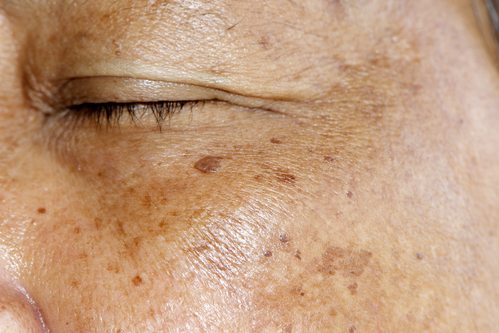Irregular skin pigmentation can be caused by several different factors. Discoloration can be caused by your body’s physical reaction to its environment, exposure to sunlight, or a hormonal change. Whether you’re struggling with acne scars, rosacea, sun damage, or melasma, we offer many treatment options and are ready to help you learn how to treat irregular skin pigmentation. Often, the best results are achieved through a series of treatments. But because each patient’s skin care needs are unique, we want to make sure we find the approach that best fits your individual needs and lifestyle.
Causes of Skin Pigmentation
Acne Scars
Unfortunately, acne can follow you into adulthood. Whether your acne is caused by hormones or your skin’s reaction to external irritants, blemishes can leave your skin pocked with acne scars. Depending on your skin tone, acne scars can appear brown or even purple and red. And oftentimes, it can take months to reduce or eliminate acne scars. DermaHealth offers several treatments to help reduce the appearance of acne scars. Learn more about each option and how to treat irregular skin pigmentation on our website. To learn about causes of adult acne, visit our blog.
Rosacea
Rosacea is more common than you might think. An estimated 14 million people live with the skin condition. The most well known symptom of this condition is redness of the face and cheeks. But there are other symptoms as well, including swollen or sensitive skin, visible broken blood vessels, breakouts, and dry or rough skin. Treatment options can help revitalize and firm skin to reduce the appearance of rosacea.
Sun Damage
The sun poses one of the most serious threats to your skin. Not only does excessive sun exposure cause premature aging and potentially skin cancer, but it also leads to wrinkles and pigmentation changes. The sun can cause sunspots and freckles, and it can worsen scars, existing age spots, and fine lines. This doesn’t mean you should lock yourself inside; some exposure to sunlight is necessary in order for your body to produce vitamin D, which is key for normal bone growth. But overexposure to ultraviolet or UV rays can be detrimental to your skin.
Melasma
Melasma is a common skin problem that is often misdiagnosed as sun damage. It usually appears as brown or gray patches on the face, especially around the cheeks, the bridge of the nose, the forehead, the chin, and the upper lip. The exact cause of melasma is not yet clear, but exposure to sunlight, intense heat, irritating skin care products, and changes in hormones can exacerbate the condition and cause dark patches to appear on the skin. This condition is especially common with pregnant women due to the numerous hormonal changes the body goes through during pregnancy. This is why melasma is commonly referred to as the mask of pregnancy.
How to Treat Irregular Skin Pigmentation
Chemical Peels
Chemical peels can be an effective treatment for all skin types, and our skin care experts can help you select the best peel for your condition. Chemical peels range in intensity from mild to medium depth and are great ways to exfoliate dead skin and activate new cell growth. Removing dead cells reduces the appearance of sun damage and age spots.
Topical Skin Care Products
For some patients, a simple change to your beauty regiment can improve skin conditions. This is part of the reason DermaHealth carries Epionce. A physician who is extremely passionate about skin care developed the Epionce line. One of the most popular items in the Epionce line is the prescription bleaching cream, which penetrates deep into the skin to inhibit excess melanin production. We also offer Elure, which works on the skin’s surface to lighten and gradually fade sun and acne spots over several months.
Microdermabrasion
This popular treatment is effective at reducing fine lines and sun damage while leaving your skin with a fresh and healthy glow. It’s non-invasive, which means there’s no downtime or recovery process, and treatments can continued monthly. This service is ideal for those who want to address multiple skin issues. Many clients combine multiple treatments for optimal results.
Laser Treatments
Laser treatments can be used to address multiple skin conditions, from rosacea and sun damage to tough-to-treat acne. And because laser treatments are noninvasive and nonsurgical, they don’t interrupt your daily routine. Come in for a free consultation to explore your treatment options – we want to help you find the best approach to minimizing your irregular skin pigmentation.
_____
Everyone’s skin type and body chemistry are different. Therefore, there is no one-size-fits-all approach to correcting irregular skin pigmentation. At DermaHealth, our experienced skin care technicians can help find a solution that works for you. It’s time to learn how to treat irregular skin pigmentation. To learn more, please give our Springfield Med Spa a call at 417-447-7777 or schedule a free consultation. We look forward to hearing from you!







